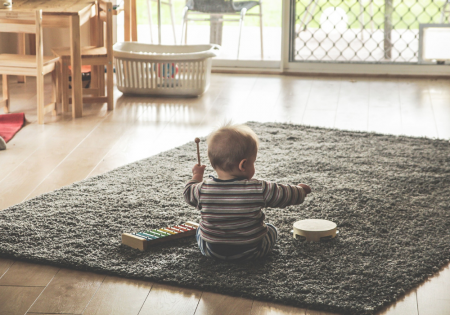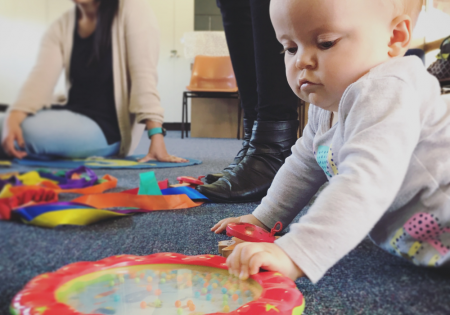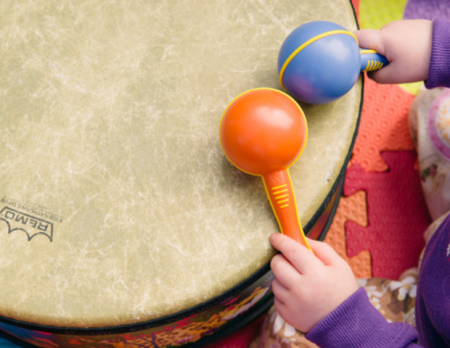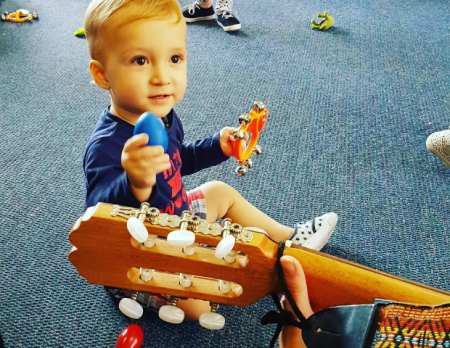Media kindly brought to you by Music Beat
Throughout history, music has been a useful teaching tool to support children’s learning and development. For thousands of years, the creation of music has helped children develop social, emotional, cognitive and emotional skills. Cultural rituals, celebrations and stories passed down from generation to generation have enhanced children’s learning experiences.
Through the introduction of technologies, from the gramophone to the iPhone, music continues to be an integral part of our daily lives. However, where we once created the music our children heard, we now listen to that which is created by others.
Did you know that 95% of a child’s brain develops by the age of 5 years? This proves why we need greater emphasis on their early years of development.
As a parent, you are your child’s first teacher. What better way to positively influence the formative years of your child’s growth than through the universal language that connects all humankind.
So, how can creating music help my child’s development?
We speak with Dr Vicky Abad, Founder and Managing Director of Music Beat Australia, and researcher at the University of Queensland, to learn about the benefits parent-child music has on young children’s development.
A recent study from The University of Queensland that you were involved in has shown informal ‘music participation at home improves numeracy, prosocial skills and attention over and above the effects of shared book reading’.
From your research, can you tell us how making music with children impacts family well-being?

“Music is a such a fantastic tool that can help support all elements of child development and is one of the few activities that engages the whole brain.
Musicbolsters and enables better parent-child interactions and early learning opportunities. It allows a beautiful way for parents to create routines and rituals that make everyday existence happier and easier.
Research shows us that when music is shared between a parent and a child in the home there are long term social and cognitive benefits for the child.
Parents can tap into this and make music a part of their everyday experiences with their child.
Parents can do this because music is innate in all human beings. You don’t have to be musical or have training in music because we all have the potential to be musical. Everyone has a voice and can tap into this musical predisposition and capacity.
Children are also musical beings and born ready to interact with their musical worlds. Babies recognise their mother’s voice in utero. They are born ready to hear you as they are used to hearing your voice. I really believe that to be human is to be musical. You can tap into this evolutionary biological basis of being human and musical by using song and music in your day to day parenting, which can make it so much easier.
Music is a great educational tool for parents. As I said earlier, you don’t have to have formal music qualifications to influence your child’s learning and development through musical play and interactions .
An additional benefit to using music in your parenting practices is it will make you feel good to! Making music releases endorphins which increases feelings of connectedness and happiness. When parents interact with their children in musical ways it supports the development of happy and healthy relationships.”
As a parent, how have you found shared music at home has assisted you?

“I learned from a very early age that music has the incredible power to bring people together and transcend change or difference between generations.
Irrespective of where you sit in the social, cultural spectrum, music can be very equalising and empowering as it is something that everyone can use and benefit from.
Music is an excellent tool for providing pathways for parents and children to come together.
As a mother, I used music to make our days fun and interactive. For my daughter, I would interpret our world through song. Everything we did from an early age had an accompanying song for ‘this is the way you tie your shoe, tie your shoe”. I would indirectly teach through music and song.
Music is a lovely way for little brains to process information and is also great for concepts, i.e. colours, up and down, in and out. So when we walked to the path we would sing about walking up the hill or down the hill, or around the corner. My daughter was great at this as she used it every day in songs we made up for our daily activities.
I also used music for our daily rituals. Instead of using time-based routines, at a very early age, I used music to help her understand the ritual that informed our routine.
For example, if I sang the bath song, she it was time for a bath, then there was songs for getting dressed and songs that marked the time for her to go to bed.
Songs and musical interactions allowed her time to transition from one to the other and also understand OK this means we are now getting ready to go to bed, prepare for sleep. Music and song helped teach the transitions in our daily activities.
The ritual of going to bed was established around music, which helped transition her into sleep time.”
What are some fun activities parents can do to help give their child a head start, even if they don’t have a music background?
“Parents have been making music with their children since time began. We can trace back music making to prehistoric times. We’ve been doing this for thousands of years, it’s only been in recent years that we have started questioning our own abilities to provide musical play time with our children.
There are so many ways parents can have some fun and give their children a head start. Singing to and with your children would be my number one suggestion. If you are out of touch with early childhood music repertoire, there are plenty of resources available for you to tap into from ABC Radio to play-school, there are radio stations specifically dedicated to children.
Listening to music and singing with children also have terrific developmental benefits.
However, the process of making music with children is where the neurocognitive magic really happens. So in addition to singing, get out the pots and pans and make some music together.”
How can a music program help support a child’s early development?

“There are many ways that music programs can support early childhood development. I really see this in two distinct ways though. One is supporting you, so you can take music home to make and engage every day because you are with your child all the time, and the other is supporting the child through active participation in age and developmentally appropriate music activities.
So let’s break this down into two components:
Firstly, parents are a child’s most important teacher. Parents have to feel comfortable, empowered and confident to lead the way. A music program can help enable this. You should feel comfortable attending, comfortable participating and empowered when you leave to use the music songs, games and ideas at home. Therefore the music presented needs to be user friendly and easy to learn in short exposure. It also should be modelled in a way you can emulate. Live music allows this.
Secondly, parents should ensure that the music program they choose is written and led by someone qualified in music. To ensure that the music activities you participate in are in fact age and developmentally appropriate so they will support early childhood development and musical development, the person leading the program needs to be qualified to do so. They should have a degree in music.
In Australia, the early childhood music industry is not regulated so anyone can run a program. With this in mind
I would recommend you check that the people leading the music program are tertiary qualified and led by a qualified music teacher, music therapist or community musician. I would also check that the program was written from someone who has a clear understanding of music, music pedagogy, early childhood development and family systems.
An appropriately written and led music program helps support a child’s development and cognitive, physical, social, emotional and behavioural milestones.”
How have you used your extensive clinical experience in paediatric and early intervention music therapy and music early learning to help develop the Kids Music Beat program?
“Research is a vital part of our program and informs every aspect of its continued development. My research findings continually feed back into the program. Everything I have done in my life has impacted and fed back into the development of the business and one of the reasons I research is so I can continually build a better music program for little people and their grown–ups. It is the least we can do, provide children with the very best.”
What are the benefits that music provides children?

Social Benefits:
Through music, children can develop social skills and school readiness. These can help them enjoy a sense of community that they can carry throughout their lives.
Music is a way to build social cohesion by providing shared experiences and can help foster self-expression.
Even from an early age, music can help children build team working skills and demonstrate what it takes to create something collectively.
Emotional benefits:
Music stimulates emotions through specific brain circuits and gives us an oxytocin boost. Oxytocin is the hormone that promotes feelings of love, bonding and well-being.
Creating music helps us experience joy and how to give it to others. It also helps develop strong abilities to regulate emotions.
Overall, it improves self-esteem, lifts our spirits and brings happiness into our children’s lives, and, who wouldn’t want that!
Cognitive benefits:
Music helps improve brain power and inspires creativity. According to research, 85% of the jobs that will exist in 2030 haven’t been invented yet. Music will help your child develop the ’emotional’ part of their brain or their ‘green brain’. This helps nurture an entrepreneurial spirit and improve their lateral thinking.
Educational and Developmental benefits:
Studies have shown the effectiveness of music education has on young children, and those who participate in music classes read more efficiently and have improved speech development. Music accelerates the development of language skills enabling children to learn the sounds and meaning of words while strengthening their numeracy skills.

About Vicky Abad:
Vicky holds an Undergraduate Degree in Music, Post Graduate Degree in Music Therapy, Master’s Degree in Early Childhood Research and a PhD in music early learning and music therapy.
About Music Beat Australia

Music Beat Australia provides community music, music early learning, education and therapy programs for children and adults of all abilities.
It’s music early learning program is Kids Music Beat, the only program in Brisbane where all music is played live by music educators and music therapists. It is designed to help babies, toddlers and pre-schoolers grow into happy, confident children by fostering a love of music and helping parents to use music in the home. The program is designed by Dr Vicky Abad and is informed by the latest research.
To find your closest Kids Music Beat music group and contact Music Beat
To view on Youtube:
You may also like to read:
The Importance of music and movement in childhood









